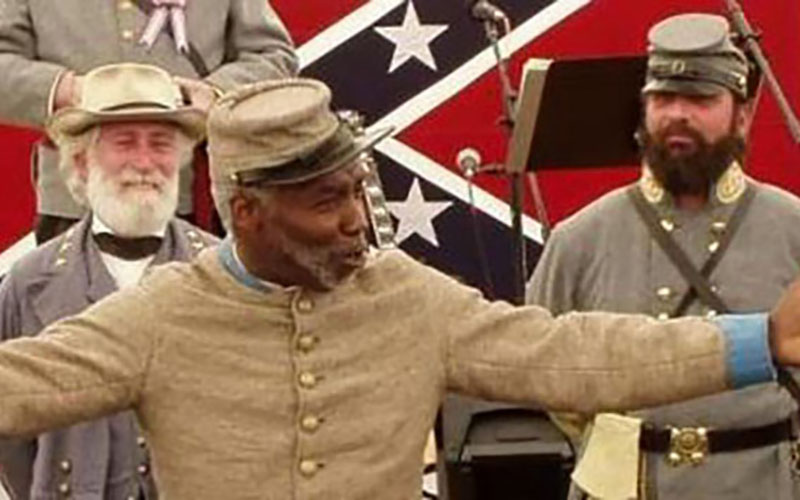
North Carolina resident H.K. Edgerton, a black member of the Sons of Confederate Veterans, addresses members of the group that they insist is about defending history and heritage. Others are not so sure. (Photo courtesy Sons of Confederate Veterans)
WASHINGTON – On Memorial Day, some Americans will head to local cemeteries to decorate the graves of fallen soldiers – in some cases, the graves of those who fought for the other side.
One of the most-cherished activities of the Sons of Confederate Veterans is the decoration of Confederate graves with that flag, particularly on Memorial Day.
But the tradition has come under attack by the House, which amended the Department of Veterans Affairs budget last week to include a ban on the display of Confederate flags in federal cemeteries.
That proposal, which would need Senate approval to take effect, was blasted this week as a “travesty” by Curt Tipton, commander of the Arizona Division of the Sons of Confederate Veterans.
“It is entirely proper that their descendants should mark their graves with the flag under which they fought, no matter where the graves are located,” Tipton wrote in an email peppered with words in all capital letters.
But supporters of the measure say Confederate flags have no place in U.S. military cemeteries.
“The Confederate flag represents hate and intolerance and is a painful reminder of a terrible time in our history,” Rep. Ruben Gallego, D-Phoenix, said in statement on the VA amendment.
“VA cemeteries should be a place where we honor war heroes – not a place where we preserve the symbols of slavery and Jim Crow,” his statement said.
Gallego, who cosponsored the VA amendment that passed the House May 19, also introduced a bill to ban Confederate flags on graves or flagpoles at VA cemeteries. That bill was introduced in July, but has yet to receive a hearing.
But the national executive director of the Sons of Confederate Veterans said “a soldier is a soldier,” and all should be recognized for their sacrifice.
“You don’t have to like it, but you have to respect it,” said Michael Landree, the executive director. “In a free society, we respect each other.”
-Click on the map for details about Confederate graves in Arizona, according to the Sons of Confederate Veterans. (Map by Emily Zentner)
Landree said the tradition of decorating graves was started after the Civil War by women on both sides, who agreed to keep up the graves of all veterans in their area.
“There was a reconciliation after the war, where ladies on both sides said, ‘We’ll take care of your graves if you take care of ours,’ since so many Confederates were buried up north and vice versa,” Landree said.
The VA currently flies the Confederate flag, separate from the U.S. flag, at cemeteries where Confederate soldiers are buried in mass graves.
Graves of individual Confederate soldiers in VA cemeteries can be decorated only on Memorial Day – or on Confederate Memorial Day in states where that is a holiday. The flags have to be provided by a private group or individual and must be removed by the end of the day, said VA spokeswoman Jessica Schiefer.
Tipton notes that Confederate veterans are currently given the same status as any other U.S. vet. They are eligible for VA headstones, grave markers and medallions, as well as for burial in Arlington National Cemetery.
Landree said proposals like the VA budget amendment or Gallego’s bill “sticks a knife in people that can no longer fend for themselves.”
“We say we respect veterans and then we turn around and do this,” he said. “Every war we have fought has reasons someone disagrees with.”
But critics, like the Southern Poverty Law Center, say it’s not the distant past that concerns them about Confederate groups.
Mark Potok, a senior fellow with the center, concedes that not everyone who wants to wave the Confederate flag “is some enthusiast for white supremacy,” but that there are “certainly some core principles of white nationalism” behind the display.
“I do think we would all be better off if people stopped the practice of displaying Confederate flags,” Potok said.
The Southern Poverty Law Center does not list the Sons of Confederate Veterans as a hate group, but it has written extensively about controversial actions of some chapters.
Potok pointed to the Mississippi chapter’s 2011 request for a state license plates featuring Confederate Gen. Nathan Bedford Forrest, who became the first Grand Wizard of the Ku Klux Klan after the war.
Tipton said it was that sort of “anti-Confederate hysteria, led by the historically ignorant” that led to proposals like the VA budget amendment.
The Sons of Confederate Veterans keeps a record on its website of Confederate graves in each state. Of thousands it believes are buried in Arizona, only 196 rest in identifiable graves in cemeteries.
“Soldiering is a universal experience,” said Landree, a retired Marine Corps lieutenant colonel.
“Someday, people will say that I fought a war for political oil,” the Iraq War veteran said. “We need to recognize that soldiers are soldiers no matter if you agree what they fought for.”